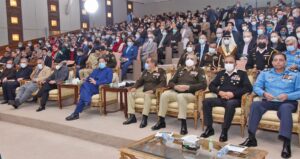
By Arooj Fatima, She is pursuing her Bachelor’s degree in International Relations at the School of Politics and International Relations at Quaid-i-Azam University, Islamabad. She can be reached at arooj0937@gmail.com
On the 27th of February, the peaceful ambiance of the QAU campus was shattered by a regrettable incident which was the latest in a series of council-driven scuffles. The ambush resulted from a clash between two opposing student groups. The altercation that ensued was marked by a violent confrontation that left around two dozen students injured, with reports of two students being in critical condition. The sight of students wielding sticks, daggers, stones, and batons incited panic and terror among the onlookers, leaving the campus enveloped in a state of chaos. In response, the university administration left with no other choice, was compelled to take the difficult decision to shut down the varsity for an indefinite period until further directives.
The social control theory provides one instrument to understand the reason for recent delinquency among student groups in QAU. The theory argues that the role of institutions is imperative to criminal activities, thus claiming that crime is the result of social institutions losing control over individuals. Here referred institutions are of family, community, breakdown of trust in government, and its policies which in return leave room for such criminal activities. When individuals are socially detached, they become more prone to violence and pursue violence as a means of self-gratification. Under the lens of this theory, an individual commits a crime when he has not developed a close connection with conventional order and normative standards of society. This determines that society plays a definite role in the advancement of individuals toward violence, thus for individuals to respect laws social institutions need to engage with them in a better manner to reaffirm their writ of maintaining order. Hence the theory highlights that in order to omit crime there is a need to strengthen the bond between individuals and society.
Moreover, society is also responsible for the process of political socialization. The way in which young people are socialized politically is shaped by various socio-political and economic institutions within a society, which are a product of the social structure of that society. These institutions also influence the formation of societal norms, which further shape the political beliefs and perspectives of individuals. In Pakistan, there are a variety of societal divisions, such as sect, religion, caste, and ethnicity, which are reflected in socio-political institutions. These divisions play crucial roles in shaping political socialization. As a result, young people from different societies have diverse understandings of government, state, religion, and ethnicity.
QAU stands as a haven for Pakistan’s youthful population, hailing from diverse social backgrounds. However, it is important to recognize that not all societies have undergone equal growth, leading to an inherent sense of injustice and deprivation among students from multicultural backgrounds. Consequently, they tend to distance themselves from mainstream society and seek refuge in sects, religions, castes, and ethnicities. The Baloch student group’s recent involvement in violent behavior is a reflection of their perceived alienation from other Pakistani societies, leading to weak social bonds. Social control theory asserts that the likelihood of delinquent behavior increases when crucial elements of social bonds weaken, including (a) attachment to schools, peers, and parents; (b) commitment to educational and occupational aspirations; (c) involvement in conventional behavior, such as school work, and belief in the moral validity of conventional norms. All these elements help to understand the reason for students’ delinquent behavior. However, of all these elements, involvement is particularly relevant, referring to the opportunity costs associated with how individuals spend their time. With idle hands being a devil’s workshop, it’s no wonder that trouble-making students at QAU display a lack of commitment to their time, further justifying their pursuit of violent tendencies.
In addition, the impact of peer association on violent behavior is a crucial aspect that cannot be ignored. It is alarming to note that on the campus premises, an unfortunate trend exists where individuals are exposed to “definitions” favorable to criminal behavior from their peer group belonging to the same ethnicity, who may lack moral and ethical upbringing and tolerance. The magnitude of exposure to these learned definitions, weighted by their frequency, duration, priority, and intensity of communication within intimate groups, surpasses unity, with the result that the newbies become vulnerable to imitating criminal activities. This not only leads to a surge in criminal behavior but also fuels the occurrence of mob violence. Therefore, it is essential to address this concerning trend by providing proper moral and ethical guidance to students, promoting tolerance and non-violence, and encouraging healthy social associations. By doing so, we can foster a safer and more inclusive campus culture, where individuals can learn and grow without compromising their values and principles.
What distinguishes QAU from other universities is not just its academic excellence, but its unwavering stance against religious extremism. QAU places a high value on state politics over religious fervor, as evidenced by its student body’s rejection of groups like Islami-Jamiat-Taliba (IJT) due to their history of promoting religiously irked violence. At QAU, the student community has a deep appreciation for cultural diversity, and the campus is celebrated as “mini-Pakistan,” representing the rich cultural heritage of the country. Unfortunately, conflict arises due to nature of male chauvinism and the lack of supervision on these issues. The recent events of Monday, February 27th, 2023, were nothing but a display of fragile male egoism, where a group of students took the attack on one of their executive ethnic student council members as an attack on their collective egos and retaliated in a violent and reprehensible manner. It is crucial to recognize that the QAU community must work together to eradicate such imprudent behavior and foster a culture of inclusivity and respect.
Equally responsible for this scuffle is the varsity administration, which has been accommodating these lawbreakers rather than cleansing them. Calling for police and rangers at the last moment to settle things is an imprudent step when the administration itself has been long ignorant of the indomitable influence of these ethnic councils. The administration has pittance control over individuals that spark violence; it never held them accountable. This inefficient system on the administrations’ part is what makes them fearless to participate in such activities. Law and order should be the priority at the campus at all times, not only when students strip each other and open the heads of their fellow students.
It is high time that we as a society recognize the harm caused by such imprudence ignited over unnecessary ethnic rivalry and work towards creating a more inclusive and equitable environment for all students. The administration as well as the students’ federation need to create a safer and more inclusive campus culture, enabling students to develop healthy social bonds and build a brighter future for themselves and their communities.
Disclaimer: The views expressed in the article are of the author and do not necessarily represent the institute’s policy.

